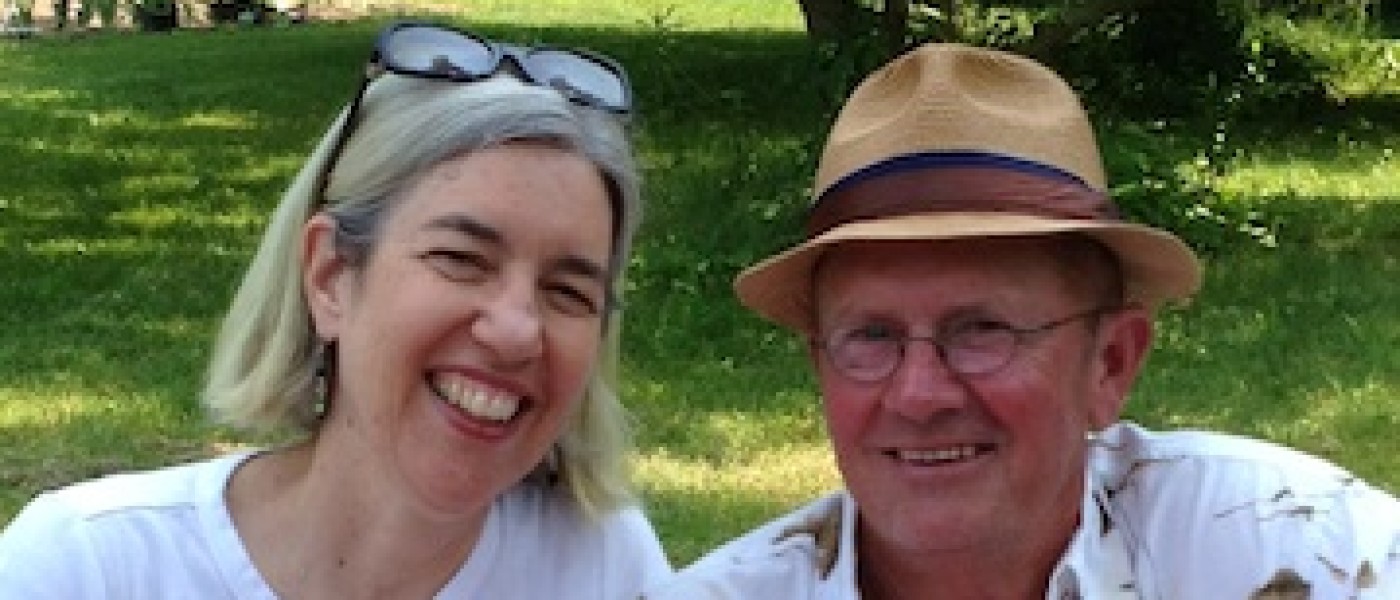Dru Peters and her husband Homer Walden operate Sunnyside Farm where they practice intensive grazing and try to leave as light a mark on the environment as possible.
Homer Walden and Dru Peters did not immediately set out to be farmers. Homer had a long career at Johns Hopkins University in an applied physics lab and Dru edited textbooks. During his stint at Johns Hopkins, Homer built upon his talents as an engineer, which would later influence the couple’s farming techniques and lead to new inventions and innovations. Dru and Homer shared their passion for eating, together learning more about food and its origin. As Dru puts it, “We truly came to farming through eating.” Today, in their second careers as farmers, everything they do on their farm is aimed at raising the best food they can, with the smallest environmental impact as possible.
For several years the couple farmed on leased land, starting the first year with just 50 chickens. Then, in 2009, Dru and Homer bought the property that was to become Sunnyside Farm. Today, the couple’s 12-½- acre farm is home to heritage breed chickens for eggs, broiler chickens, turkeys, pigs and beef cattle. All of the animals live outside and are grass-fed. The couple utilizes intensive grazing, which gives their herds and flocks the opportunity to feed on fresh grass every day. Dru and Homer do not own any tractors, rototillers or mowers—their animals do all the work!
The animals are rotated through pastures each and every day. The cows graze first, in small pastures demarcated by temporary electric fencing. When the cows have had their fill (in just one day), they’re moved onto the next pasture and in come the chickens, who enjoy earthworms, insects and a large variety of native grasses and clovers in movable pens that Homer devised. The pens are light enough for him to move by hand but provide safety for the chickens from predators while also holding up to high winds and other weather. In the process of their pecking and grazing, the chickens spread the cows’ natural fertilizer (manure), meaning there’s no need for Dru and Homer to haul manure on this farm! The rest of the animals come after, continuing to mow the grass, fertilize and till the soil.
Homer realizes that intensive grazing can be a tedious process, especially for small farmers, which is why he has developed a few tools and farm techniques to make the practice easier. Homer’s innovations are meant to give small farmers the ability “to grow a very sizeable amount of food to support themselves and to provide a lot of families with food,” explains Dru. In addition to the livestock they raise, Dru and Homer grow heirloom and open-pollinated vegetables in compost, without organic or synthetic chemicals. The vegetables are grown in the couple’s hoop house and are watered with collected rainwater through a system Homer designed that uses a solar pump to water the vegetable beds.
For Dru and Homer, Sunnyside Farm is in part a research facility. The duo aims to make information on Homer’s inventions available to as many farmers as possible. To this end, Dru and Homer have worked with the Pennsylvania Association for Sustainable Agriculture (PASA) to host field days at Sunnyside Farm. They are frequent guest speakers at PASA’s annual conference, where Homer’s mobile pens have been featured. The couple has traveled to Detroit to speak on sustainable farming practices. They visit other farms, nursing homes and schools to teach consumers about their food. Dru is an avid blogger, sharing information through her daily blog.
The Pennsylvania community (and beyond) has been a strong supporter of Sunnyside Farm. Each year, many volunteers flock to the farm for work and educational opportunities. Every growing season, Sunnyside Farm’s CSA membership reaches maximum capacity. Dru and Homer are happy to supply their community with grass-fed chicken, beef, pork, turkey and eggs. Out of all of their accomplishments and innovations, Dru and Homer say they are most proud of growing “quality food that doesn’t require fossil fuel.”
Dru and Homer would like to perpetuate the idea of using renewable resources and animals to replace harsh machinery and chemicals. They believe these modifications are environmentally friendly and cost effective, both of which are crucial characteristics for the success of family farmers.
Further Reading
- Our staffer Matt interviewed the owner of a new butcher shop that only sells local, pasture-raised meat. Find out how he’s Putting it into Practice.
- This Ask Farm Aid column answers a reader’s question about grassfed meat — whether it’s a good option for farmers, health, or the environment. Read our answer.
- For resources to find food from family farmers in your area, check out our Find Good Food page.



